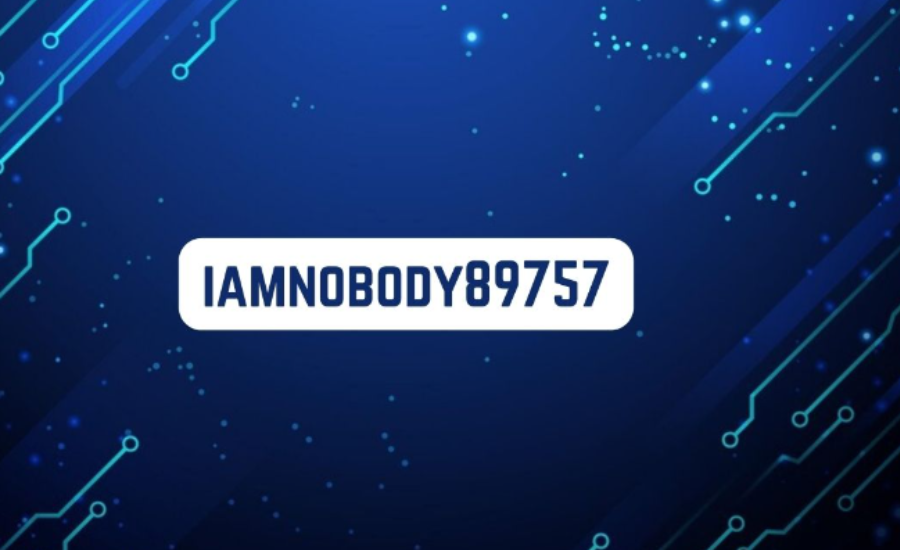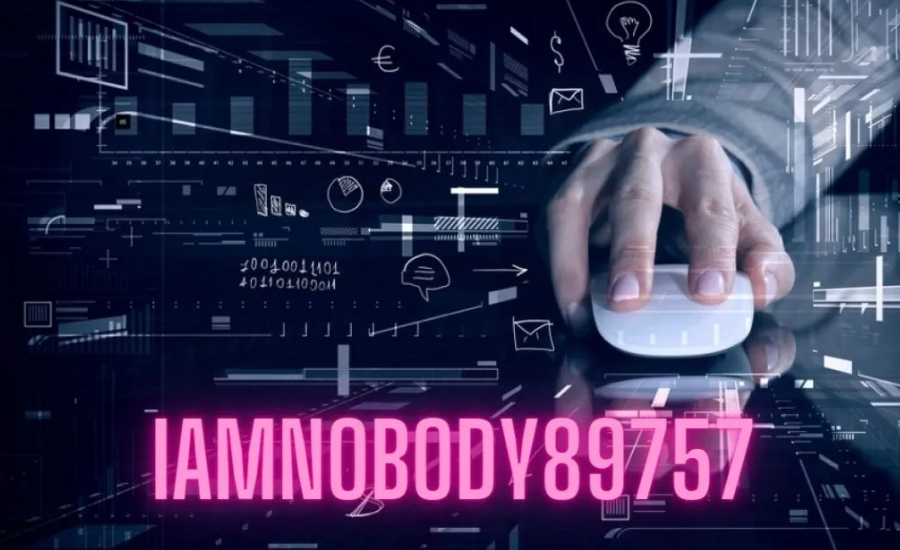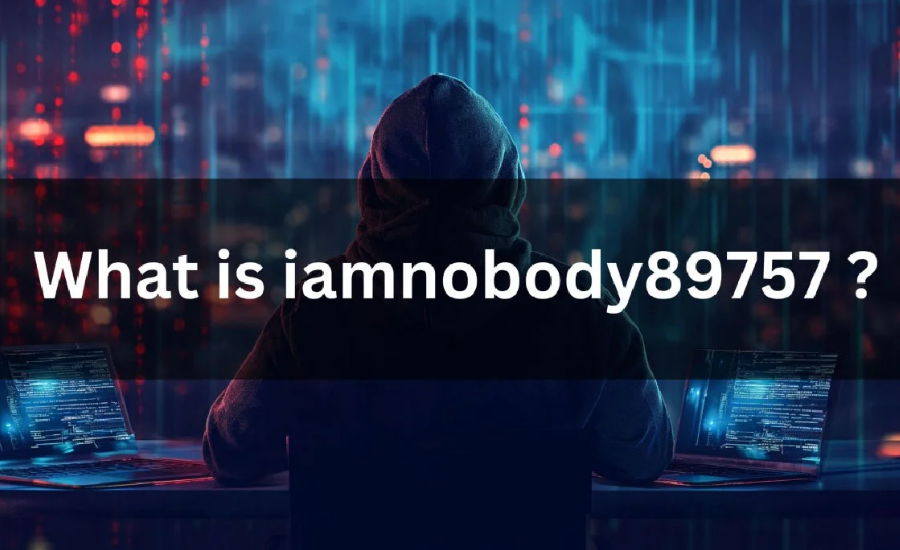In today’s vast digital landscape, the choice to remain anonymous has become an increasingly popular method for users to interact with the internet. Anonymity can serve as both a shield for personal privacy and a means of self-expression. One such intriguing digital pseudonym, “iamnobody89757,” has emerged as a curious symbol in online spaces. This article explores the significance of using online aliases like “iamnobody89757” and the role they play in shaping the culture of the internet.
The Growing Popularity Of Online Pseudonyms


The internet, once a space for sharing ideas and connecting with others, has transformed into a complex web of identities—some real, some virtual. Choosing an alias, such as “iamnobody89757,” is no longer just a casual act but a deliberate decision with far-reaching implications for privacy and identity. For many, using an anonymous online persona allows them to engage with others while keeping their personal life shielded from the public eye.
In a world where online privacy is increasingly at risk, pseudonyms like “iamnobody89757” provide users with a sense of safety and autonomy. This alias can be an empowering choice, enabling individuals to express their thoughts without fear of personal repercussions.
The Quest For Privacy And Protection In The Digital Age
In the modern era, where data breaches and surveillance are rampant, using an alias has become a critical strategy for safeguarding personal information. By hiding behind a handle like “iamnobody89757,” users are able to communicate, play games, and join forums without revealing their true identity to the masses. This anonymity not only protects against potential threats such as identity theft but also shields users from the bias that often accompanies known identities.
Moreover, adopting such a pseudonym can also foster a sense of freedom. For some, it’s a way to separate their digital self from their real-world persona, enabling them to interact in ways that might be difficult or impossible under their legal name. It’s a subtle but powerful act of liberation, offering an escape from the confines of societal expectations.
Understanding The Psychological Appeal Of Anonymity

There is a psychological aspect to adopting a digital pseudonym. The concept of anonymity in the virtual realm allows individuals to behave without the same constraints they may feel in real life. For example, many online gamers and forum participants opt for usernames like “iamnobody89757” because it enables them to communicate more freely. These personas can be curated to represent aspects of themselves they wish to explore or express without concern for how others perceive them based on their real-world identity.
At the same time, this form of anonymity can lead to what is known as the “online disinhibition effect,” where individuals may engage in behavior they wouldn’t normally exhibit offline. While this can result in more open dialogue and uninhibited creativity, it also opens the door for more harmful actions, such as trolling and cyberbullying, as users feel less accountable for their words and actions.
The Influence Of Anonymity On Digital Communities

Anonymity can significantly shape the interactions within online communities. For platforms ranging from social media networks to gaming hubs, pseudonyms like “iamnobody89757” allow users to engage in conversations and activities without judgment. These digital personas create a space where individuals can connect over shared interests rather than preconceived notions about their real-life identity.
However, while anonymity can lead to more inclusive and diverse discussions, it can also complicate the enforcement of community standards. The absence of identifiable markers means that negative behavior, such as harassment, can be more difficult to trace and address. Many online platforms, therefore, face the ongoing challenge of balancing the freedom anonymity offers with the need for accountability and responsible behavior.
Fostering Positive Online Engagement With Pseudonyms
The use of online aliases, such as “iamnobody89757,” underscores a fundamental question in the digital age: how do we maintain privacy and freedom of expression while also ensuring that online spaces remain respectful and safe? While anonymity can provide a buffer against negative consequences, it also brings with it a certain level of risk. To maximize the positive aspects of pseudonyms, it’s essential for users and platforms alike to prioritize respectful communication, digital ethics, and accountability.
For example, platforms that allow pseudonyms could consider implementing systems that allow users to remain anonymous while also holding them accountable for inappropriate actions. In this way, anonymity becomes a tool for freedom and expression, but not a license for harmful or destructive behavior.
Conclusion: The Complex Nature Of Digital Identity

The use of online pseudonyms like “iamnobody89757” highlights a complex relationship between digital identity, privacy, and self-expression. In a world where personal information is often vulnerable to exploitation, these aliases offer a valuable layer of protection, allowing users to explore and communicate without exposing their true selves. Whether it’s for privacy, freedom, or the ability to escape societal expectations, digital identities such as “iamnobody89757” are crucial to understanding the evolving nature of the internet.
However, as much as pseudonyms empower users, they also carry a responsibility to maintain a balance between anonymity and accountability. Moving forward, it will be essential for both users and platforms to navigate this space thoughtfully, ensuring that online anonymity remains a tool for creativity and expression, while also fostering safe, respectful environments.
Key Takeaways:
- Privacy First: Using aliases like “iamnobody89757” provides an effective way to safeguard personal information and control one’s online presence.
- Expression Without Judgment: Anonymity enables users to interact without the constraints of societal biases, encouraging more honest and open dialogue.
- Accountability Matters: While anonymity can be empowering, it’s essential for platforms to enforce community guidelines that discourage harmful behavior.
- The Digital Balance: Striking the right balance between freedom of expression and responsible behavior is key to the future of online communities.
Frequently Asked Questions (FAQ)
What is online anonymity?
Online anonymity allows users to engage with the internet without revealing their true identities. This is often achieved through the use of pseudonyms or usernames, such as “iamnobody89757,” which protect personal information.
Why do people choose to be anonymous online?
Anonymity allows individuals to express themselves freely, engage in sensitive discussions, and protect their privacy without the fear of judgment or exposure.
How can anonymity impact online communities?
Anonymity can foster open communication and diverse perspectives, but it can also contribute to negative behaviors, such as trolling, if not managed properly. Platforms need to balance freedom with responsibility.
Can anonymity be dangerous?
While anonymity can protect privacy, it can also lead to a lack of accountability, encouraging harmful behaviors like cyberbullying and the spread of misinformation.
What can be done to encourage positive anonymity?
Platforms can enforce rules that hold users accountable for their actions while respecting their desire for privacy. Education on digital ethics and online responsibility is key.
Read Next: Blog Blower
